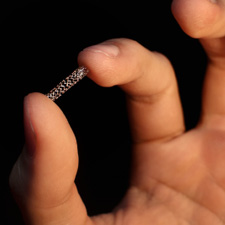Integrative Approach to Partially Blocked Coronary Arteries?
I was disappointed to learn that coronary stents are no better than other treatments for preventing future heart attacks. What’s the integrative medicine viewpoint on how best to handle partially blocked coronary arteries?
Andrew Weil, M.D. | August 16, 2013

Stents are small mesh tubes made of metal or fabric that are placed in narrowed or weakened arteries during angioplasty, a procedure used to restore blood flow to the heart. Some stents (called drug-eluting stents) are coated with medication that is slowly released. The overall goal is to help reduce chest pain (angina) caused by reduced blood flow to the heart through a partially blocked coronary artery, and the long term objective is to prevent heart attacks, which occur when blood flow to a portion of the heart is completely cut off. As you state, however, the ability of stents to lower heart attack risk is far from impressive when compared with standard medical care.
I discussed your question on integrative care for patients with partially blocked coronary arteries with Stephen Devries, M.D., Executive Director, Gaples Institute for Integrative Cardiology. Dr. Devries tells me that the optimal integrative approach emphasizes nutrition and lifestyle, combined with the best of conventional medicine.
He explains that the foundation of heart health is a Mediterranean-style anti-inflammatory diet, rich in vegetables, fruit, whole grains, nuts, olive oil, more fish and less meat. This alone has been shown to cut heart disease risk by more than 70 percent. Daily exercise is another essential. "Even 30 minutes of daily recreational walking makes a big difference. More can be better, but intensity needs to be individually guided by your physician," Dr. Devries says. Another often overlooked element is a mind/body practice, like meditation, yoga, or biofeedback, to cultivate mindfulness and quiet the involuntary nervous system. Dr. Devries notes that a recent study showed a nearly 50 percent reduction in serious problems among heart patients with a daily meditation practice.
Dr. Devries adds that these nutrition and lifestyle strategies should be integrated with proven medical treatment, including aspirin, statins (to lower cholesterol and reduce inflammation), and possibly other heart-protective medications including beta blockers (to lower heart rate), ACE inhibitors (to reduce blood pressure), and nitroglycerin (to improve blood flow).
He explains that invasive procedures such as stenting can be helpful for some, but unless the situation is unstable, they should generally not be the first line of treatment, noting that "sadly, conventional medical care often emphasizes the role of pills and procedures. For optimal heart health, I recommend an integrative approach that does not neglect conventional medicine but that keeps nutrition and lifestyle front and center."
I agree.
Andrew Weil, M.D.









